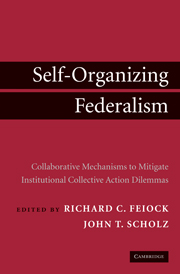 Self-Organizing Federalism
Self-Organizing Federalism Book contents
- Frontmatter
- Contents
- List of Figures
- List of Tables
- Contributors
- Preface
- PART ONE SELF-ORGANIZING VERSUS CENTRALIZED SOLUTIONS TO INSTITUTIONAL COLLECTIVE ACTION PROBLEMS: THEORETICAL CONSIDERATIONS
- PART TWO INTEGRATING METROPOLITAN SERVICE PROVISION: NETWORKS, CONTRACTS, AGREEMENTS, AND SPECIAL DISTRICTS
- PART THREE INTEGRATING REGIONAL POLICIES THROUGH NETWORKS, JOINT VENTURES, AND PARTNERSHIPS
- 9 Collaborative Institutions, Functional Areas, and Beliefs: What Are Their Roles in Policy Networks?
- 10 Sustaining Joint Ventures: The Role of Resource Exchange and the Strength of Interorganizational Relationships
- 11 Institutional Collective Action in an Ecology of Games
- 12 Enhancing Vertical and Horizontal Self-Organization: Harnessing Informal Networks to Integrate Policies within and between Governments in the European Union
- PART FOUR SELF-ORGANIZING GOVERNANCE AND INSTITUTIONAL COLLECTIVE ACTION
- References
- Index
11 - Institutional Collective Action in an Ecology of Games
from PART THREE - INTEGRATING REGIONAL POLICIES THROUGH NETWORKS, JOINT VENTURES, AND PARTNERSHIPS
Published online by Cambridge University Press: 29 January 2010
- Frontmatter
- Contents
- List of Figures
- List of Tables
- Contributors
- Preface
- PART ONE SELF-ORGANIZING VERSUS CENTRALIZED SOLUTIONS TO INSTITUTIONAL COLLECTIVE ACTION PROBLEMS: THEORETICAL CONSIDERATIONS
- PART TWO INTEGRATING METROPOLITAN SERVICE PROVISION: NETWORKS, CONTRACTS, AGREEMENTS, AND SPECIAL DISTRICTS
- PART THREE INTEGRATING REGIONAL POLICIES THROUGH NETWORKS, JOINT VENTURES, AND PARTNERSHIPS
- 9 Collaborative Institutions, Functional Areas, and Beliefs: What Are Their Roles in Policy Networks?
- 10 Sustaining Joint Ventures: The Role of Resource Exchange and the Strength of Interorganizational Relationships
- 11 Institutional Collective Action in an Ecology of Games
- 12 Enhancing Vertical and Horizontal Self-Organization: Harnessing Informal Networks to Integrate Policies within and between Governments in the European Union
- PART FOUR SELF-ORGANIZING GOVERNANCE AND INSTITUTIONAL COLLECTIVE ACTION
- References
- Index
Summary
The main goal of this volume is to explain how governance authorities in a particular policy arena overcome fragmentation and solve vertical and horizontal collective action problems. Our chapter addresses this goal in two ways: first, we apply Norton Long's (1958) analysis of the ecology of games played in territorially defined metropolitan areas to regional governance, and second, we analyze the relationships between collaboration networks, trust, and political influence in the context of regional land-use and transportation policy. The central argument of the ecology of games framework is that local political outcomes emerge from actors pursuing their self-interest in multiple, interdependent, and rule-structured games. The resulting decisions lead to the type of fragmentation and decision externalities discussed throughout this volume. Collaborative partnerships and networks are considered potential self-organizing mechanisms for overcoming these dilemmas, and our empirical study explicitly examines the resulting patterns of cooperation, trust, and political influence.
Our use of the ecology of games metaphor is partly a reaction to the burgeoning social science literature that examines the dynamics and effectiveness of collaborative processes as new institutions for political decision making. This literature itself has emerged in response to (and perhaps also partly caused) the widespread appearance of collaborative policy and its aliases in nearly every policy subsystem, especially environmental policy (O'Leary, Gerard, and Bingham 2006). These collaborative institutions are designed to alleviate many symptoms of institutional collective action (ICA) problems discussed in this book.
- Type
- Chapter
- Information
- Self-Organizing FederalismCollaborative Mechanisms to Mitigate Institutional Collective Action Dilemmas, pp. 229 - 260Publisher: Cambridge University PressPrint publication year: 2009


